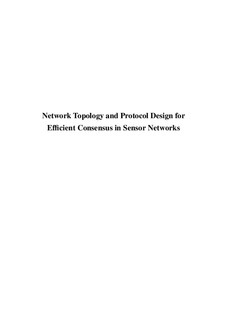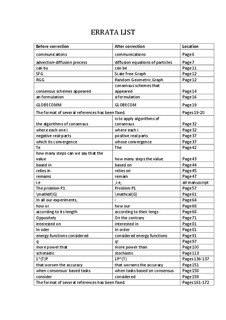| dc.description.abstract | In the new era of Internet of Things, complex sensor networks are becoming
crucial to link the physical world to the Internet. These sensor networks,
composed by hundreds or thousands of nodes, provide many important services
to promote a heightened level of awareness about the area of interest
such as in predictive maintenance, intelligent buildings, enhanced security
systems, etc. In order to make these services possible, several signal processing
tasks are needed to support their operation, some widely used examples
of these tasks are parameter estimation, signal detection and target tracking.
These tasks allow to improve the services by inferring missing data, reducing
samples noise, etc., at the cost of some collaboration of the network nodes
that implies their repeated communication over time. Most of these solutions
are consensus-based strategies, which have recently attracted a great deal of
research work because of its simplicity. These are in-network algorithms,
where each node only exchanges information with its immediate neighbors
and these are able to obtain global information as a function of some sensed
data. A relevant example is the average consensus algorithm, which its goal
is to obtain, in a distributed way, the average of the initial data. These algorithms
avoid the need of performing all the computations at one or more sink
nodes, thus, reducing congestion around them and incrementing the robustness
of the network.
In this dissertation, we focus on improving consensus algorithms in terms
of different parameters and under different types of communications and network
configurations. Each setting considered requires its own assumptions
and methodologies, since the convergence conditions for each of them are
related but different in general. In particular, in this work, all of the methodologies
proposed are based on designing how the underlying communications
are performed.
In static networks, where the asymptotic convergence to the average value
is easily ensured, a topology optimization can be a priori performed in terms
of several relevant parameters. In particular, we optimize the network topology
to make consensus algorithms fast and energy efficient. In this setting
and for continuous systems, we derive a general framework to minimize several
energy related functions under different network and nodes constraints To solve it, we propose a fractional convex-concave optimization problem
with different constraints that leads to obtain the optimal topology in terms
of the energy function considered. As a significant variation of the previous
results, we also optimize the network topology in discrete systems. The
discretization of the system introduces a weight matrix and certain step-size
(related to the discrete increments of time) in the process. We show that if
this step-size is small enough, the energy related problems stated before can
be still casted as convex-concave fractional problems with the weight matrix
as a unique optimization variable. As the step-size of the process increases
in size, a discrete system requires a different approach. To solve it, we aim to
find another formulation based on adding a constraint on the connectivity and
solving the problem several times (for different values of the step-size). In
addition, two low-complex methodologies with different computational requirements
are proposed to a posteriori redesign an existing topology by the
collaboration of the network nodes.
On the contrary, in time-varying (random) networks, it is needed to guarantee
a minimum accuracy of the algorithm, while maximizing the number of
simultaneous exchanges of data to ensure fast convergence. Regarding random
and asymmetric communications, we propose a novel gossip algorithm,
which is based on the residual information that is generated when an asymmetric
communication is performed. We exploit this information to preserve
the summation of the process and accelerate it. Moreover, our proposal is
useful in the case of having both unicast and broadcast communications, presenting
faster convergence in both schemes than existing approaches in the related
literature. When the problem of wireless interferences constraining the
communications is additionally taken into account, we propose a novel and
computationally efficient link scheduling protocol that correctly operates in
the presence of secondary interference. Our protocol is easily implementable
and does not require global knowledge of the network. The main objective
of this new protocol is to be suitable for a cross-layer scheme in which the
execution of the average consensus algorithm is favoured, ensuring necessary
conditions for its convergence with certain accuracy. Additionally, the
number of simultaneous links is additionally considered in order to make the
convergence of the consensus process as fast as possible. | nb_NO |


